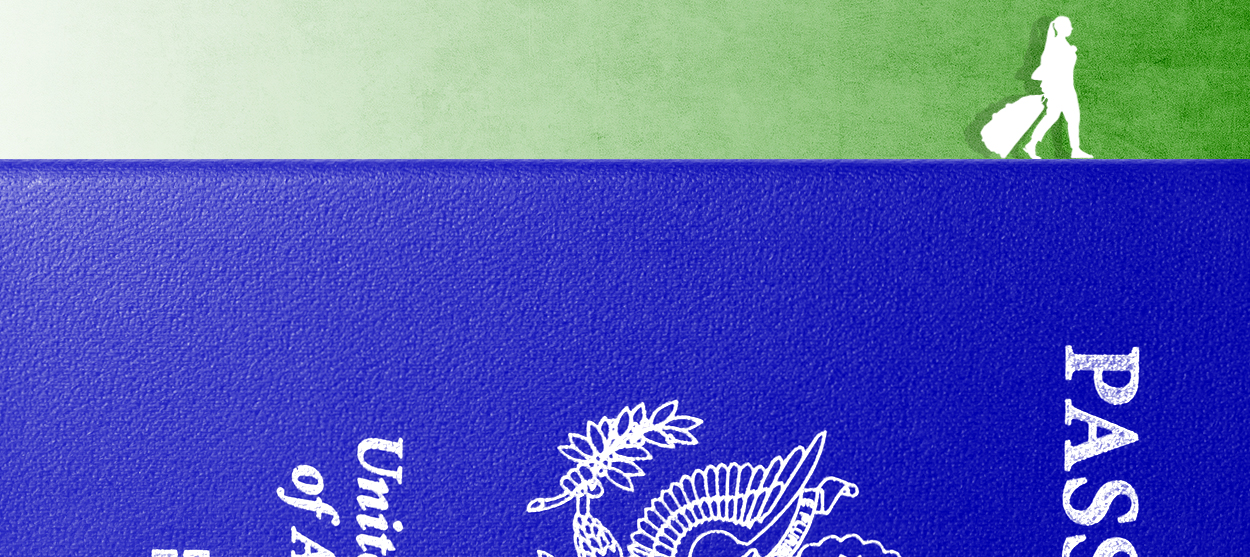The privilege of an American passport
"Expats" and "nomads" aren't asked to "wait their turn"


A free daily email with the biggest news stories of the day – and the best features from TheWeek.com
You are now subscribed
Your newsletter sign-up was successful
I made an impulsive decision to spend last January living in Mexico City. As a freelance writer, I could arrange my schedule to take so much time away from the United States. As a U.S. citizen, my passport automatically allowed me to live in Mexico for up to six months as a tourist.
I bought my plane tickets two weeks before arriving and booked an Airbnb that about was around one third of my usual rent in the Bay Area. The night before I left, I packed my suitcase, worrying only about not forgetting my passport and laptop, the two things most essential to my visit.
Once I landed, the Mexican official at immigration greeted me with a friendly "Bienvenida!" and asked only one question: "Trabajo o de turista?" "Business or tourism?" Once I responded "turista," he took about eight seconds to review my passport, stamp it, and send me on my way.
The Week
Escape your echo chamber. Get the facts behind the news, plus analysis from multiple perspectives.

Sign up for The Week's Free Newsletters
From our morning news briefing to a weekly Good News Newsletter, get the best of The Week delivered directly to your inbox.
From our morning news briefing to a weekly Good News Newsletter, get the best of The Week delivered directly to your inbox.
While I experienced such ease traveling to Mexico last year, at the exact same time, the migration of people from Mexico was literally shutting down the U.S. government. It felt deeply unfair that I was granted such a quick and easy process to live in Mexico, while simultaneously, so many from Mexico had to risk their lives to enter the United States.
I couldn't simply enjoy the country without also grappling with what my presence there really meant. As a U.S. citizen, I can take a last-minute trip to Mexico — and many other countries — anytime I seek inspiration. With U.S. passport privilege, I spent one-third of my 20s doing just that: freely roaming the world, exploring and writing without judgment or condemnation from any country. For so many others, this is utterly impossible.
Mexican-American writer Rigoberto González wrote about this disconnect in the Los Angeles Times:
On social media, I post pictures of my meals, the embroidered shirts I purchase, the bright murals on the walls throughout the neighborhoods, but the exchanges I have with Oaxaqueños are heavy with anxiety: "What of those children in cages?" I'm asked. "What of the raids? Is it true the president will throw all the Mexicans out?" [Los Angeles Times]
As a Latinx U.S. citizen traveling in Mexico last January, it felt impossible not to ask myself the same questions.
A free daily email with the biggest news stories of the day – and the best features from TheWeek.com
Even among liberal and progressive friends, an ability to migrate freely is assumed: Many upset with the most recent presidential election claimed they would leave the country in protest. Travel magazines and articles like this one in CNN often comment on the appeal of moving to Mexico "to escape from mounting political tensions in the United States." This is a common pattern among U.S. citizens: an entitlement to other people's countries, even as we allow our government to refuse those trying to enter our own.
After moving to Cape Town in 2015, I wrote a widely-shared essay sanctimoniously arguing about the benefits of leaving the United States and living abroad. But at the time, I didn't fully recognize or acknowledge the passport privilege that allowed me to have that experience in the first place. My privilege meant I could easily decide to leave the U.S. when its culture or politics frustrated me, and choose another country that suited me better at the time. And, if ever I needed the U.S. for its unique financial opportunities to advance my life or career, I could then just as easily return.
This privilege is the biggest difference between how we perceive people migrating from developing countries and young U.S. millennials moving abroad, as Mawouna Remarque Koutonin noted in The Guardian.
My parents came to the United States with a green card, no access to U.S. dollars, and a Spanish last name, and received the label of "immigrant." I landed in South Africa with a U.S. passport, an Ivy League degree, and a U.S. credit card, and received the label of "expat."
As writer Matt Hershberger has argued before, many travel terms become infused with racial and class assumptions: "a wandering Australian working his way around Southeast Asia while on gap year is a 'backpacker' or a 'nomad,' while a traveling Mexican worker in the U.S. is a 'migrant worker.'" When first lady Melania Trump reportedly broke immigration law in 1996 by working as a model in the United States without a visa, this was perceived as a minor technicality. Yet we criminalize less-privileged people when they do the same. U.S. citizens working under the table at ski resorts are excused as "ski bums" while undocumented workers in those same towns are dehumanized as "illegals" by the right-wing press.
Migration law and tourism alike take the desire for movement and constricts it, designating only certain people as worthy of this right. At its best, travel allows for exploration and creates moments for people of faraway places to encounter each other. But at its worst, as Bani Amor has written extensively about, it can reinforce neocolonialist ideas of who is entitled to space and who isn't. Imbalanced migration policies and the tourism industry both give a privileged few their pick of the world while telling everyone else they must ask for permission first.
My experiences traveling and living abroad have helped me fully internalize the arbitrary and discriminatory nature of our immigration rules. It's far easier to argue for "playing by the rules" when, as U.S. citizens, so many of those rules work to our advantage. In the CNN article on U.S. expats in Mexico, Cathy Peoples, a U.S. citizen, says it only took her six weeks to become a legal resident in Mexico. "They took my U.S. driver's license and traded it for my Mexican driver's license," she said. "So that was as easy as could be."
Meanwhile, the people I'd meet abroad would explain the arduous process they had to endure just to enter the United States: Some had to submit to lottery systems. Others had to prove their financial independence with pay stubs and savings. Others had to buy round-trip tickets to prove a departure date from the U.S., without any guarantee they would even be allowed to arrive. In all my travels, no country required me to go through any of these obstacles. As a U.S. citizen, I could show up almost anywhere around the world, with few restrictions. As U.S. citizens, no one questions our "right" to be in Mexico, or most other countries we travel to. We are rarely asked to "wait our turn."
Looking back, it was far too easy for me to be in Mexico. Our country has made it far too difficult for others to enter. With migration issues routinely dominating our political discourse, it's more important than ever for U.S. citizens to understand our privilege: We take advantage of an unjust system that allows us to easily move about the world while others must sacrifice everything to do the same.
Want more essential commentary and analysis like this delivered straight to your inbox? Sign up for The Week's "Today's best articles" newsletter here.
Amanda Machado is a writer and facilitator on issues of race, gender, and sexuality. She's written for The Atlantic, The Washington Post, Harper's Bazaar, Vox and several other publications. You can learn more at www.amandaemachado.com.
-
 Political cartoons for February 15
Political cartoons for February 15Cartoons Sunday's political cartoons include political ventriloquism, Europe in the middle, and more
-
 The broken water companies failing England and Wales
The broken water companies failing England and WalesExplainer With rising bills, deteriorating river health and a lack of investment, regulators face an uphill battle to stabilise the industry
-
 A thrilling foodie city in northern Japan
A thrilling foodie city in northern JapanThe Week Recommends The food scene here is ‘unspoilt’ and ‘fun’
-
 Epstein files topple law CEO, roil UK government
Epstein files topple law CEO, roil UK governmentSpeed Read Peter Mandelson, Britain’s former ambassador to the US, is caught up in the scandal
-
 Iran and US prepare to meet after skirmishes
Iran and US prepare to meet after skirmishesSpeed Read The incident comes amid heightened tensions in the Middle East
-
 Israel retrieves final hostage’s body from Gaza
Israel retrieves final hostage’s body from GazaSpeed Read The 24-year-old police officer was killed during the initial Hamas attack
-
 China’s Xi targets top general in growing purge
China’s Xi targets top general in growing purgeSpeed Read Zhang Youxia is being investigated over ‘grave violations’ of the law
-
 Panama and Canada are negotiating over a crucial copper mine
Panama and Canada are negotiating over a crucial copper mineIn the Spotlight Panama is set to make a final decision on the mine this summer
-
 Why Greenland’s natural resources are nearly impossible to mine
Why Greenland’s natural resources are nearly impossible to mineThe Explainer The country’s natural landscape makes the task extremely difficult
-
 Iran cuts internet as protests escalate
Iran cuts internet as protests escalateSpeed Reada Government buildings across the country have been set on fire
-
 US nabs ‘shadow’ tanker claimed by Russia
US nabs ‘shadow’ tanker claimed by RussiaSpeed Read The ship was one of two vessels seized by the US military
